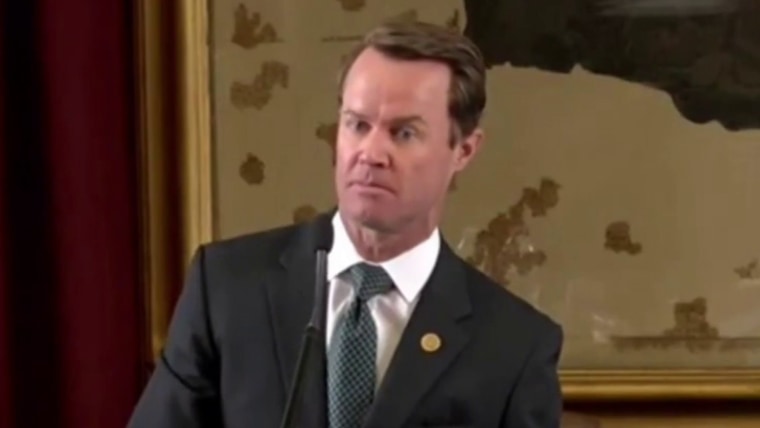Texas lawmakers passed a restrictive elections bill out of the state legislature on Tuesday, after a monthslong battle with Democrats who fled the legislature repeatedly to try and block the bill.
The bill passed the Texas House and Senate on Tuesday afternoon in a pair of votes with on; it now heads to the desk of Republican Gov. Greg Abbott, who is expected to sign it into law. The legislation, a sweeping overhaul of election rules and regulations, will likely be challenged in the courts.
“I look forward to signing Senate Bill 1 into law, ensuring election integrity in Texas,” Abbott said in a statement thanking lawmakers for passing the bill.
The bill, approved 80-41 in the House and 18-13 in the Senate, is very similar to previous versions of the legislation. According to the bill’s House sponsor state Rep. Andrew Murr, only a single change was made to the draft the House agreed on last week — removing an amendment intended to prevent people who make honest mistakes from being charged with felony voter fraud, like in the case of Crystal Mason, who was sentenced to years in prison for attempting to vote while on supervised release from prison.
Democrats criticized the change as punitive and problematic. Bill author Sen. Bryan Hughes, defending the change, read aloud details of Mason's tax forgery conviction and said she had signed a provisional ballot application affirming she hadn't been convicted of a felony.
"Those are the facts about the Crystal Mason case," Hughes said, later saying the courts had deemed her a "threat."
Mason has said she was being helped by a poll worker and didn't read the fine print; she testified she didn't know she was ineligible to vote.
Once enacted, the law will ban overnight and drive-thru early voting, both of which were popular in Houston's Harris County during last year’s pandemic. While lawmakers had previously considered a bill that would have limited Sunday morning early voting, the final version of the legislation increases the number of hours on Sunday that counties must offer from five to six hours.
The bill also adds a new ID requirement for absentee voting. While signature matching was used in the past to verify voter signatures, voters will now require voters to include their driver’s license number, a similar identification card or the last four of their Social Security number on mail ballot applications and the envelope holding their ballot. The bill also creates a process to correct information on mail ballots.
Under the bill, partisan poll watchers and people helping voters cast a ballot will be subject to a raft of new rules and regulations governing their conduct. Partisan poll watchers will be trained and empowered to move more freely around the polling place and obstructing a watcher will become a criminal offense. Those helping voters will have to fill out paperwork disclosing their relationship and recite an oath for poll workers.
Democrats have declared the bill “Jim Crow 2.0” and said it’s designed to suppress the votes of voters of color.
Earlier versions of the bill triggered two walkouts of the Texas House by Democratic lawmakers, who waited out the clock during two legislative sessions this year. More than 50 state Democrats flew from Austin to Washington, D.C. in July to deny the legislative chamber the legal quorum needed to conduct business. They spent nearly a month in Washington advocating for federal voting legislation that would kneecap many of the changes included in the bill but a quorum was eventually restored in August after Democrats trickled back to the legislature, some citing the Covid pandemic in their decision to return.
Republicans say the legislation is necessary to prevent voter fraud from occurring, despite broad evidence indicating voter fraud is exceedingly rare. Texas Attorney General Ken Paxton’s office spent 22,000 hours looking for voter fraud in 2020 and uncovered just 16 cases of false addresses on registration forms, according to the Houston Chronicle. Nearly 17 million voters are registered in Texas.
"This thing's not over," said state Rep. Trey Martinez Fischer, a Democrat who helped lead the walkout in July. He said opponents of the bill would "shift our focus from lawmaking to litigating" while continuing to lobby for federal voting legislation.
Voting rights advocates sharply opposed the bill.
"SB 1 will make it harder and scarier to vote and to run elections, especially for communities of color and disabled voters. If lawmakers had listened they would know that Texans want voting to be easy and accessible," said Tommy Buser-Clancy, senior staff attorney at the American Civil Liberties Union of Texas.
"light" - Google News
September 01, 2021 at 01:28AM
https://ift.tt/3DyZ1il
Texas Republicans' restrictive election bill gets final green light - NBC News
"light" - Google News
https://ift.tt/2Wm8QLw
https://ift.tt/2Stbv5k
Bagikan Berita Ini
















0 Response to "Texas Republicans' restrictive election bill gets final green light - NBC News"
Post a Comment